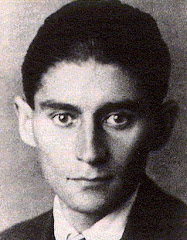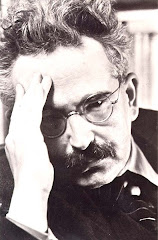It occurs to me, upon reading Poe's "The Purloined Letter" and several interpretations offered by Lacan, Derrida, Shoshana Felman, and Barbara Johnson, respectively, that literature itself is the "purloined letter." Allow me to explain:
Literature draws words from the world and assembles them or frames them. In a sense, it purloins them from language. Literature says, "Out of all the possible words which make up the ever altering universe, I am telling you to look here, at me, and find an example, a blueprint, a representation, in my finite words, in my beginning, middle, and end, a basis for relating to all that I have left out." Literature says, "I am the epigram to life. Do not overlook me for the narrative. Do not dismiss me as fiction posing in a shop window as you pass on to reality! I am the meaning." Literature says, "Do not ask from where I gather my authority. Do not seek out my origins, which will lead you only into darkness, but simply accept me as I am, a text, in your hands. Only do not merely accept me. Rather accept me by challenging me."
Literature is an illicit letter, illicit because in its finititude and framing, it has undermined the authority of language. For literature is always unfaithful to the law, to ideology. No matter what motivations drive literature, its letters always disseminate that its meaning is engaged in an affair with something besides the letter of the law. Literature, in its illicitness, in its subversiveness is guilty of a crime. Perhaps, guilty is too strong a word. Rather, it is framed of a crime. (We are always guilty of the crime of framing). The crime of literature, however, is never detected by those against whom it does violence. For the laws which literature, in its sheer presence, dissolves, are blind. Blind justice cannot see the letter whose contents spell mutiny for the law. And blind justice does not want to see. For if it saw, it would indeed be undone. Its tenacity lies in the fact that it is oblivious.
Literature, on the other hand, thinking itself to be invisible because it is unseen by the law is vulnerable to theft. Literature, when its letter is stolen, cannot protest, since in protesting, it would call attention to itself, awaken justice, and bring down judgment upon itself. And furthermore, it cannot prosecute anyone of theft, since to do so would be to invoke the law, a bond to which it itself has repudiated in its very act of existence.
Those who purloin literature, or the letters of literature, are bound to have their letters purloined in turn. For in so far as letters exist, they inexorably give way to purloinery. Which is why, Lacan tells us, the word "purloin" also means "prolong." The cycle of theft can never be escaped, since in so far as we as selves are creating, we are stealing. Even when we put words in quotes, we are putting them in quotes. We are choosing them out of all the other words and phrases.
If in the beginning, according to one purloined letter, God created the world with words, with speech, this suggests that God purloined from language, and in so purloining, in so framing, gave way to existence. Thus, from the dark and void depths of language itself, God spoke, "Let there be light." There was light not simply because God said so, but because God didn't say all the other things that God could have said. God didn't say let there be sand or ^*T%()% or *&^^5^).
But creation, too, if it is a kind of framing of infinity in finitude, can never cease.
For as authors, readers, interpreters, and indeed, mere characters on the stage of nothingness in which all things appear simply as holes in the nothing, we are always creating in our very act of perceiving, existing, comprehending, and feeling. And we are creating because we are purloining. Because we are signifying the unnamed signified.
Tuesday, July 1, 2008
Subscribe to:
Post Comments (Atom)






No comments:
Post a Comment